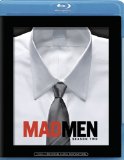| Reviews & Columns |
|
Reviews DVD TV on DVD Blu-ray 4K UHD International DVDs In Theaters Reviews by Studio Video Games Features Collector Series DVDs Easter Egg Database Interviews DVD Talk Radio Feature Articles Columns Anime Talk DVD Savant Horror DVDs The M.O.D. Squad Art House HD Talk Silent DVD
|
DVD Talk Forum |
|
|
| Resources |
|
DVD Price Search Customer Service #'s RCE Info Links |
|
Columns
|
|
|
Mad Men: Season 2
Lionsgate Home Entertainment // Unrated // July 14, 2009 // Region 0
List Price: $49.99 [Buy now and save at Amazon]
"It will shock you how much this never happened."
If you
want to be cynical about it, the art of advertising is painting a glossy, beautiful lie and selling it as the truth. Don Draper (Jon Hamm) is damned good at it, both in his office that towers over Madison Avenue as well as in a seemingly idyllic life at home. Mad Men is set in the early 1960s: the years when the stiflingly prim and proper façade of the '50s was being chipped away by the social upheaval that was soon to come. Don may have had more practice at it than most, but everyone in this era is selling some sort of false perception: an immaculate exterior to mask the dark, sticky underbelly lurking just out of sight. He's just found a way to better capitalize on it.
Don rewards himself at one point by shelling out for a shiny new Coup de Ville, and even with as much care as he takes to keep it free from any grime or smudges, it's soon spattered in vomit. That is, of course, a metaphor for his life as a whole. The false front that Don had been pushing forward started to crumble at the close of Mad Men's first season, threatening to expose to his wife Betty (January Jones) the deceit, infidelities, and complete myth of a life he'd spent so many years hiding. The series' second season picks up more than a year later -- opening on Valentine's Day in 1962 -- and in that time, Don's been on his best behavior. Neutering himself has robbed Don of his edge, though, rendering him impotent in both his bedroom and at the office. Bowing to his once-submissive wife, Don seems unable to assert himself enough to order room service or flick around the channels in a hotel room without his decisions being expressly made for him. It's not any easier at the offices of Sterling Cooper. The face of advertising is changing, and clients are demanding that younger and younger copywriters be brought into the firm to tap into a youth demographic they find almost alien. Older, established talent at Sterling Cooper is finding itself muscled aside to make room for the young, brash upstarts, and it's a sweeping change encouraged by the company's head of accounts, Duck Phillips (Mark Moses). Despite the fact that it was Don that brought him into the fold, Duck is still reeling from the personal and public humiliations that cost him his last job, and if he has to browbeat Creative into submission to meet his lofty promises of financial growth, then so be it.
Ultimately, though, Mad Men isn't about crafting clever ad campaigns or the squabbles between creativity and commerce. The series is driven by the gulf that separates the perception we want people to have and the considerably less pleasant truth. As realized by creator Matthew Weiner (The Sopranos) and the tremendous ensemble cast he's assembled, the richly woven tapestry of Mad Men explores these ideas through its complex, multidimensional characters. There are no easy answers. There are no heroes or villains. Take Duck Phillips, for instance. Yes, the stance he takes at Sterling Cooper is self-serving and shuns artistry in favor of columns in a ledger, but it's hardly irrational to argue for continuing to grow the company and to offer clients what they're demanding. Fleshed out by a remarkably nuanced performance by Mark Moses, Duck doesn't settle into some cold, abrasive stereotype. He's determined and outwardly confident, to be sure, but at least at the outset, it doesn't seem to be misdirected. I get the impression he's someone I'd feel comfortable working alongside, at least. At the same time, he's a recovering alcoholic trying desperately to prove his worth...both to himself and to the board at Sterling Cooper. Duck gets increasingly petulant as things go sour, and twice we see him at a crossroads: at moments where he can choose to hold onto his dignity...onto the tattered remnants of the happiness he once knew...or plowing ahead at all costs at the office. Because this is a richly drawn figure brought to life by such a gifted actor, seeing him make those destructive decisions is heartbreaking, regardless of the fact that Duck stands in the way of Mad Men's central character.
Don can't
be sure who his allies -- if he truly has any -- are at Sterling Cooper. Pete Campbell (Vincent Kartheiser) looks at Don as a father figure, but it oftentimes seems to be with resentment as much as admiration. Though Pete proves himself to be more and more capable at the office, his homelife is in tatters: fawning over a woman he can never have, alienating a wife (Alison Brie) who just wants to live the cliché, and discovering that a secure future that seemed all but assured is fading before him. Don used to be able to rely on Roger Sterling (John Slattery) for support, but the smug, smarmy partner is starting to side more with Duck in the power play between Creative and Accounts, and he's distracted besides. Roger is more drawn to the chase, and abandoning the familiar and reliable in favor of something shiny and new is a recurring theme throughout the season.
Throughout the first season of Mad Men, Betty Draper seemed to be nearly as much of a child as her young son and daughter. She stumbles uncomfortably through adulthood this season, coming to grips with the power of her sexuality and reshaping herself into the sort of icy blonde with whom Hitchcock would've been instantly smitten. Betty struggles with her changing identity as well, clawing at some way to define herself other than Mrs. Don Draper or a mother of two young children. Sex in Mad Men generally isn't an act of lust or love; it's about asserting power. Rachel Menken seems like an increasingly distant memory as Don becomes ensnared in an affair with Bobbie Barrett (Melinda McGraw), the wife of a loudmouthed insult comic (Patrick Fischler). The frenzied fling reinvigorates Don, but it's a constant game of oneupsmanship as they each try to prove who's dominating the other.
This season of Mad Men is set shortly before the dawn of the second wave of feminism, and women were still categorized as either doting wives and mothers or disposable whores. Peggy Olson (Elisabeth Moss) is seemingly the only person in the office that doesn't disappoint Don on some level, and yet the mousy junior copywriter is still dismissed by virtually everyone else at Sterling Cooper. Seemingly all of Peggy's male coworkers sneer at her for being a delicate girl, and the only time this season she manages to impress them is when she sinks to their concept of what a woman ought to be. On the opposite end of the spectrum, office manager Joan Holloway (Christina Hendricks) isn't taken seriously because of her pinup curves; Peggy is ignored for not being overtly sexual enough while Joan is shrugged off as nothing more than Marilyn Monroe on a different coast. Joan is forced this season to deal with the fact that she's getting older, and the only way to escape being the office sex kitten is to get a ring slipped on her finger. She briefly steps into a different position at Sterling Cooper this season, and though Joan relishes the challenge and proves to be exceptionally good at it, that can't last because to them, she's nothing more than a glorified secretary or someone to leer at as she floats out of the room. Joan is visibly jealous of Peggy as she assumes a position of increased importance and power in the company, but there's only one thing she can do to escape the stifling box into which she's been compartmentalized, and even that soon deadens her spirits in one of the season's most shocking and difficult to watch scenes.
With the
rise of the feminist movement just months from where this second season of Mad Men leaves off, it'll be intriguing to see how the face of the series is reshaped when the next set of episodes make their bow. Even in what we see here, the tide is starting to turn. The women on Mad Men become more assertive while its men are just trying to keep hold of the power they once had. The series' exploration of sex and gender isn't limited to the interplay between male and female either. Staff artist Salvatore Romano (Bryan Batt) is so closeted that it's uncertain if he thinks of himself as gay, despite an obvious crush on a male account manager at Sterling Cooper and the urges that have gone unspoken for two seasons now. It's not made any easier when Sal has a chance to see firsthand how the men of Sterling Cooper react upon learning that one of their coworkers is gay -- that Sal is astonished at such a casual admission of homosexuality by Kurt (Edin Gali) but quietly recoils when he's mocked afterwards. The only disappointments I have there are that we see so little of Sal this year -- he's only showcased in "The Golden Violin" -- and that Mad Men's lone openly gay character happens to be a gifted hairdresser too. It's not unforgiveable that Kurt would fit a particular stereotype, but I wouldn't have thought a series this clever and sharply written would take such an obvious Queer Eye... route.
Mad Men is also brimming with religious imagery, including one episode that closes with a metaphorical baptism. This season sees the introduction of Father Gill (Colin Hanks), the sort of progressive priest who seems to herald the sweeping changes that would soon come to the Catholic church with Vatican II. Both Gill and Don learn of the secret that so deeply shames Peggy, and they each approach it from entirely different directions. Don encourages Peggy to forget it -- in much the same way his own troubled past doesn't even qualify as a distant memory -- while Gill is hellbent on having her embrace it...for Peggy to seek the love and forgiveness she doesn't think she deserves by confessing. Mad Men isn't a series that settles for easy answers, though, and the way it addresses the palpable chemistry between Peggy and Father Gill isn't what jaded viewers might expect either. The church weaves itself into her life this season in other ways as well, drawing from Catholic imagery to shill popsicles and having Peggy step into the role of creative director herself while grudgingly promoting a church-sponsored dance.
From the
pervasive fear of the Cuban missile crisis to a gaggle of teary-eyed secretaries weeping about Marilyn Monroe, another of Mad Men's greatest strengths is how deftly it weaves key events of the 1960s into its episodes. The series is, appropriately, primarily interested in how history can shape or help explore its characters, and it makes some compelling decisions in that regard. When addressing the civil rights movement, for instance, Mad Men veers away from stock plot points about prejudice and focuses instead on pretentious copywriter Paul Kinsey (Michael Gladis). Is he sincerely passionate about the movement? Is he truly in love with his black girlfriend (Donielle Artese)? He may, perhaps, but not as much as he cares about the ascot-wearing, pipe-chomping, progressive image he's crafted of himself. The early 1960s isn't just a backdrop for Mad Men; its setting is a defining characteristic, and it would be an unrecognizably different series if set at any other point in time. A staggering effort has been invested in reproducing these years down to the most minute detail -- for those viewers who lived through the era, Mad Men ought to feel like a return home -- and the incorporation of so many real-life brands like Playtex, Utz Snacks, and Mohawk Airlines contributes further to that sense of verisimilitude. Mad Men isn't merely set in 1962: it escapes into it.
That same level of masterful craftsmanship is pervasive throughout every facet of the series. Its cinematic photography, nuanced performances, richly layered writing, and startlingly beautiful set, costume, and production design put Mad Men in a class all its own. As darkly dramatic as the series so often is, Matthew Weiner and his staff of writers still manage to incorporate a terrific sense of humor into the mix. I can honestly say I'll never look at a fox stole quite the same way again, and how cacklingly ironic is it that Mad Men deals with ousting an incontinent alcoholic from the firm by taking him out for a booze-drenched night on the town? This is inarguably one of the best series on television, and Lionsgate has seen fit to lavish Mad Men with an equally impressive release on Blu-ray. This three disc set boasts lossless audio, a gorgeous high definition presentation, and, between the thirteen episode season and its sprawling selection of extras, some thirty-five hours of material in total. Making this season set all the more compelling is its exceedingly modest asking price; the Blu-ray release isn't priced at a premium over the DVD set, and several online retailers are selling it for just a couple of dollars more than many day-and-date movies that can't approach the quality or quantity of what Mad Men has to offer. Because it does build so extensively on its first season, I wouldn't suggest that new viewers dive headfirst into this set -- it's a more rewarding experience starting from the beginning -- but the overwhelming quality of Mad Men both as a series and as a Blu-ray release make for a near-essential purchase. Highly Recommended.
Video
From its dazzling use of color to its meticulous reproduction of the early 1960s, Mad Men is a series that demands to be experienced in high definition. As was the case throughout its first season, I frequently found myself distracted by how sumptuously lit and richly detailed this 1080p image can be. Mad Men is filmed with a keenly cinematic eye, and the texture of its film grain complements the series wonderfully. For those admirers of the series who up till now have only caught Mad Men on blurry cable broadcasts, this Blu-ray set ought to be revelatory. There are a few minor stutters, though. As Peggy says her prayers in bed near the end of "Meditations in an Emergency", her jittery, off-kilter motions look as if someone misdialed the frame rate for a couple of seconds. The fine details of Don's coat as he comforts Betty in "The Inheritance" shimmer strangely as well. Otherwise, I couldn't spot any stutters throughout these AVC encodes, each of which is given a fair amount of room to breathe on the three BD-50 discs.
Audio
Each episode of Mad Men is bolstered by a 24-bit, six-channel DTS-HD Master Audio soundtrack, and the series sounds terrific on Blu-ray. Mad Men is driven most intensely by its dialogue, which is rooted in the front channels and is consistently rendered cleanly and clearly throughout. The music -- its original score as well as the many songs that further flesh out a sense of place and time -- roars from every speaker. Much of the activity in the surrounds is owed to the music, and although the sound design is largely rooted across the front in general, there's still quite a bit of color in the rear channels. The reverb as Don watches a screening of Antonioni's La Notte and as Father Gill delivers a sermon, background chatter and ringing phones in the office, hiss from the Drapers' hi-fi, and the bickering of neighbors through thin apartment walls all contribute to its sense of immersion. The surround channels are used to particularly strong effect in the season finalé, subtly reflecting just how inescapable the dread of the missile crisis was in that day and age. The nature of the series doesn't lend itself to flashy split-surrounds or swooping dynamics, but Mad Men's sound design suits the material rather well, and the mix is flawless, not marred by the slightest flicker of distortion or inappropriate hiss.
There are no dubs or downmixes on this Blu-ray set, but Mad Men does offer subtitles in English (traditional and SDH) and Spanish.
Extras
Between the episodes themselves, more than two dozen audio commentaries, and additional featurettes and extras, some thirty-five hours of content are spread across these three discs, making the second season of Mad Men one of the most sprawling special editions I've seen in a decade of reviewing.
Each episode this season is accompanied by a pair of audio commentaries:
Much of the
key cast and crew is given a chance to participate at some point, including several from positions that often go unrecognized on audio commentaries. Of the thirteen episodes this season, all but "The New Girl" feature some sort of commentary by creator Matthew Weiner.
For what it's worth, I did listen to all twenty-six tracks in full, and they struck me as more of a mixed bag than the assortment from the series' first season. The commentaries with the cast in particular are frequently disappointing. In far too many of these tracks, they settle into the habit of quietly watching each episode and lobbing out the occasional comment, and even then it's more likely to be a quick quip than any sort of insight. The commentary for "The Inheritance" with January Jones, Jon Hamm, and Vincent Kartheiser might get the nod as the worst in that respect. Even actors who I'd think would be especially well-suited to this sort of thing can be a letdown. As indescribably funny and charming as John Slattery and Joel Murray are, their conversation over "Six Month Leave" plays more like a low-energy episode of Mystery Science Theater 3000 with random jabs like "...and your pocket is orange!" and "there's no Santa Claus, baby." I was also disappointed that Mad Men's advertising consultant was brought onto an episode that doesn't take advantage of his job description, and once Bob Levinson finishes chatting about how he came onboard the series, his comments are interchangeable with most anyone else they could've brought into the recording booth. Of the actors, Elisabeth Moss has the most to contribute, and it's appreciated that she appears in four of these commentaries, including both of the tracks for the season finalé.
The one cast-only commentary that I found to be an essential listen is "The Mountain King", which pairs together Robert Morse and Christina Hendricks. The two of them are exceptionally personable, especially the warm, fatherly Morse who does a wonderful job keeping a steady stream of conversation bubbling. Among its highlights are Hendricks noting that she originally auditioned for a different role altogether, how her "great purple dress" was more memorable to one viewer than the shocking indignity Joan suffers in this episode, Morse's confusion when he was first told he had to take his shoes off to play Bert Cooper, and a confession about swiping a philosophy book from the set. Another standout is Lesli Linka Glatter and January Jones' commentary for "A Night to Remember", pointing out how Peggy settles into the role of creative director while Father Gills becomes more of an account manager as they promote a church-sponsored dance, and both note how certain events from the episode mirror what they and their families had witnessed at some point. Weiner's commentaries are consistently the best of the lot, and aside from his track over "Flight 1" with Jon Hamm -- which is quieter, more giggly, and more heavily weighted around surface notes than his eleven other tracks this season -- they're all rewarding listens.
The highlights
throughout these twenty-one hours or so of audio commentary are too many to fully list, of course, but among them are Weiner being wowed by a stretch of the studio that looked like "Stanley Kubrick's living room" and somehow had to be incorporated into the series, delving into the relationship between consumerism and garbage, horizontally flipping a scene in the premiere, the meticulous research that goes into mimicking the set for a 1960s-era TV spot, having someone on the payroll whose job it is to light cigarettes, the deaths that inspired a dramatic turn in "Flight 1", the real-life basis of the struggle between Creative and Accounts, the mirror images pervasive throughout "Maidenform" and "Meditations in an Emergency", the social aspects of dealing with tragedy, scripting every last gesture in a dramatic sex scene, crafting prototypes of breakaway chairs, an electrical fire that wound up being a happy accident, and the daunting task of reproducing the world of 1962 with so little time to prepare, including digging through Universal's archives for drapes and having umbrellas custom-made and Fedex-ed to the set. These commentaries also field a few questions some viewers may have had. Is the resemblance between Betty's ailing father and presidential candidate John McCain intentional? Did January Jones dub in any of the dialogue by the curiously similar sounding Joy (Laura Ramsey)? At what point did one teetotaler fall off the wagon, exactly?
"An Era of Style" (22 min.; HD) documents fashion trends throughout the 1960s. The featurette begins with the 'Classic Era' that spans 1960 and 1963 -- the setting for the first two seasons of Mad Men -- emphasizing the gray flannel suits that were a staple of menswear as well as the particularly feminine dresses worn by women. From there, it explores how the mod British influence, miniskirts, and pantsuits that gained such a foothold in the middle of the decade would soon make way for the hippie revolution of the Rebellious Era. A number of stylists and fashion experts offer their thoughts, and "An Era of Style" incorporates glimpses of wardrobe culled from the show when appropriate.
The disparity
between genders in the early 1960s is one of the key elements that shapes Mad Men, and the two-part "Birth of an Independent Woman" (43 min.; HD) delves into how the forced subservience of the previous decade would soon be upended. Punctuated by excerpts from the series, "Birth..." opens by touching on the perceived role of each gender in the wake of World War II and how women who strived for more in life than playing the part of oversexualized housewife were dismissed as mentally unstable. This changed with the release of Betty Friedan's The Feminine Mystique in 1963 -- a year after the second season's setting and a suggestion that much will have changed in the next set of episodes. "Birth..." then takes a look at the crossover between the civil rights movement and the second wave of feminism, including how rampant sexism was among many supposedly-enlightened liberal males. Also addressed here are the changing face of the workplace, the recognition of women as more sexual creatures in the wake of The Pill, and the acceleration of the abortion debate.
"Time Capsule:
Historical Events of the 1960s" (HD) is an interactive feature that further explores this season's backdrop of 1962. Every episode features several topics of discussion, and there are more than thirty in all. It's a remarkably diverse selection, among them floorplans of the White House, a featurette on The Defenders and the landmark episode "The Benefactor" in particular, interviews with the men who've run some of the legendary New York restaurants featured this season, sheet music for "The Hall of the Mountain King", a timeline of upgrades to the Utz Snacks manufacturing lines, a conversation with a Maidenform rep, detailed discussion about Mark Rothko's abstract artwork, and interviews and archival footage about the space race. Also included are lists of the most popular TV shows, books, plays, films, soap operas, and albums of 1962. An enormous amount of effort has clearly been invested in this feature, which is attractively designed, meticulously researched, and demands a couple of hours to be fully explored.
Rounding out the extras is a sampler for the second season soundtrack, offering thirty second excerpts of "Lollipops & Roses" by Jack Jones, "The Infanta" by The Decemberists, "Blue Room" by Perry Como, "Break It to Me Gently" by Brenda Lee, "Telstar" by The Tornadoes, "Pot Can't Talk About the Kettle" by Helene Smith, "Crooked Woman" by Edd Henry, and "A Beautiful Mine" by Jim Jacobsen.
Completists may be somewhat disappointed to learn that the "Inside Mad Men" clips from AMC's website have not been included. In their commentary for "Three Sundays", Elisabeth Moss and Colin Hanks also chat about a gag reel that, unless it's hidden as an Easter Egg, is nowhere to be found here either.
This second season of Mad Men comes packaged in a slimmer case than the initial set, and an episode guide is tucked inside along with a clever Clorox ad. The thirteen episode season is spread across three BD-50 discs, each with a main menu matching the screened artwork. It's also worth noting that Mad Men is a region-free set.
The Final Word
In its second season, Mad Men remains one of the most masterfully crafted and endlessly compelling series on television. Its release on Blu-ray is equally dazzling, from its stunning high definition presentation to its more than twenty-four hours of extras. As was the case with the initial set, Lionsgate has priced this high-def release of Mad Men's second season to be competitive with the DVD box, discarding the usual premium most studios tack onto their Blu-ray discs. I'd suggest that the uninitiated start with the first season, of course, but especially considering that several online retailers are offering such an outstanding Blu-ray set for just $30 or so, Mad Men is a near-essential purchase. Highly Recommended.
If you
 |
| [click on the thumbnail to enlarge] |
Don rewards himself at one point by shelling out for a shiny new Coup de Ville, and even with as much care as he takes to keep it free from any grime or smudges, it's soon spattered in vomit. That is, of course, a metaphor for his life as a whole. The false front that Don had been pushing forward started to crumble at the close of Mad Men's first season, threatening to expose to his wife Betty (January Jones) the deceit, infidelities, and complete myth of a life he'd spent so many years hiding. The series' second season picks up more than a year later -- opening on Valentine's Day in 1962 -- and in that time, Don's been on his best behavior. Neutering himself has robbed Don of his edge, though, rendering him impotent in both his bedroom and at the office. Bowing to his once-submissive wife, Don seems unable to assert himself enough to order room service or flick around the channels in a hotel room without his decisions being expressly made for him. It's not any easier at the offices of Sterling Cooper. The face of advertising is changing, and clients are demanding that younger and younger copywriters be brought into the firm to tap into a youth demographic they find almost alien. Older, established talent at Sterling Cooper is finding itself muscled aside to make room for the young, brash upstarts, and it's a sweeping change encouraged by the company's head of accounts, Duck Phillips (Mark Moses). Despite the fact that it was Don that brought him into the fold, Duck is still reeling from the personal and public humiliations that cost him his last job, and if he has to browbeat Creative into submission to meet his lofty promises of financial growth, then so be it.
Ultimately, though, Mad Men isn't about crafting clever ad campaigns or the squabbles between creativity and commerce. The series is driven by the gulf that separates the perception we want people to have and the considerably less pleasant truth. As realized by creator Matthew Weiner (The Sopranos) and the tremendous ensemble cast he's assembled, the richly woven tapestry of Mad Men explores these ideas through its complex, multidimensional characters. There are no easy answers. There are no heroes or villains. Take Duck Phillips, for instance. Yes, the stance he takes at Sterling Cooper is self-serving and shuns artistry in favor of columns in a ledger, but it's hardly irrational to argue for continuing to grow the company and to offer clients what they're demanding. Fleshed out by a remarkably nuanced performance by Mark Moses, Duck doesn't settle into some cold, abrasive stereotype. He's determined and outwardly confident, to be sure, but at least at the outset, it doesn't seem to be misdirected. I get the impression he's someone I'd feel comfortable working alongside, at least. At the same time, he's a recovering alcoholic trying desperately to prove his worth...both to himself and to the board at Sterling Cooper. Duck gets increasingly petulant as things go sour, and twice we see him at a crossroads: at moments where he can choose to hold onto his dignity...onto the tattered remnants of the happiness he once knew...or plowing ahead at all costs at the office. Because this is a richly drawn figure brought to life by such a gifted actor, seeing him make those destructive decisions is heartbreaking, regardless of the fact that Duck stands in the way of Mad Men's central character.
Don can't
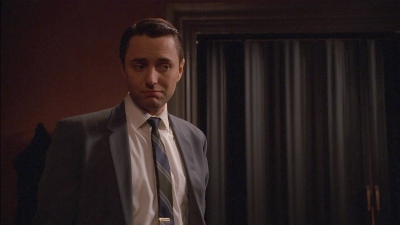 |
| [click on the thumbnail to enlarge] |
Throughout the first season of Mad Men, Betty Draper seemed to be nearly as much of a child as her young son and daughter. She stumbles uncomfortably through adulthood this season, coming to grips with the power of her sexuality and reshaping herself into the sort of icy blonde with whom Hitchcock would've been instantly smitten. Betty struggles with her changing identity as well, clawing at some way to define herself other than Mrs. Don Draper or a mother of two young children. Sex in Mad Men generally isn't an act of lust or love; it's about asserting power. Rachel Menken seems like an increasingly distant memory as Don becomes ensnared in an affair with Bobbie Barrett (Melinda McGraw), the wife of a loudmouthed insult comic (Patrick Fischler). The frenzied fling reinvigorates Don, but it's a constant game of oneupsmanship as they each try to prove who's dominating the other.
This season of Mad Men is set shortly before the dawn of the second wave of feminism, and women were still categorized as either doting wives and mothers or disposable whores. Peggy Olson (Elisabeth Moss) is seemingly the only person in the office that doesn't disappoint Don on some level, and yet the mousy junior copywriter is still dismissed by virtually everyone else at Sterling Cooper. Seemingly all of Peggy's male coworkers sneer at her for being a delicate girl, and the only time this season she manages to impress them is when she sinks to their concept of what a woman ought to be. On the opposite end of the spectrum, office manager Joan Holloway (Christina Hendricks) isn't taken seriously because of her pinup curves; Peggy is ignored for not being overtly sexual enough while Joan is shrugged off as nothing more than Marilyn Monroe on a different coast. Joan is forced this season to deal with the fact that she's getting older, and the only way to escape being the office sex kitten is to get a ring slipped on her finger. She briefly steps into a different position at Sterling Cooper this season, and though Joan relishes the challenge and proves to be exceptionally good at it, that can't last because to them, she's nothing more than a glorified secretary or someone to leer at as she floats out of the room. Joan is visibly jealous of Peggy as she assumes a position of increased importance and power in the company, but there's only one thing she can do to escape the stifling box into which she's been compartmentalized, and even that soon deadens her spirits in one of the season's most shocking and difficult to watch scenes.
With the
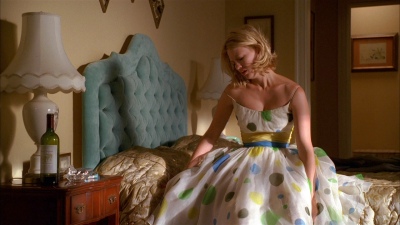 |
| [click on the thumbnail to enlarge] |
Mad Men is also brimming with religious imagery, including one episode that closes with a metaphorical baptism. This season sees the introduction of Father Gill (Colin Hanks), the sort of progressive priest who seems to herald the sweeping changes that would soon come to the Catholic church with Vatican II. Both Gill and Don learn of the secret that so deeply shames Peggy, and they each approach it from entirely different directions. Don encourages Peggy to forget it -- in much the same way his own troubled past doesn't even qualify as a distant memory -- while Gill is hellbent on having her embrace it...for Peggy to seek the love and forgiveness she doesn't think she deserves by confessing. Mad Men isn't a series that settles for easy answers, though, and the way it addresses the palpable chemistry between Peggy and Father Gill isn't what jaded viewers might expect either. The church weaves itself into her life this season in other ways as well, drawing from Catholic imagery to shill popsicles and having Peggy step into the role of creative director herself while grudgingly promoting a church-sponsored dance.
From the
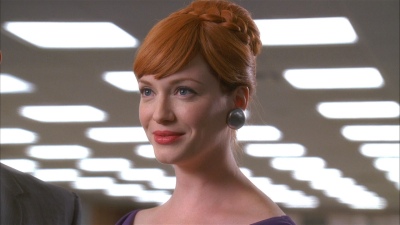 |
| [click on the thumbnail to enlarge] |
That same level of masterful craftsmanship is pervasive throughout every facet of the series. Its cinematic photography, nuanced performances, richly layered writing, and startlingly beautiful set, costume, and production design put Mad Men in a class all its own. As darkly dramatic as the series so often is, Matthew Weiner and his staff of writers still manage to incorporate a terrific sense of humor into the mix. I can honestly say I'll never look at a fox stole quite the same way again, and how cacklingly ironic is it that Mad Men deals with ousting an incontinent alcoholic from the firm by taking him out for a booze-drenched night on the town? This is inarguably one of the best series on television, and Lionsgate has seen fit to lavish Mad Men with an equally impressive release on Blu-ray. This three disc set boasts lossless audio, a gorgeous high definition presentation, and, between the thirteen episode season and its sprawling selection of extras, some thirty-five hours of material in total. Making this season set all the more compelling is its exceedingly modest asking price; the Blu-ray release isn't priced at a premium over the DVD set, and several online retailers are selling it for just a couple of dollars more than many day-and-date movies that can't approach the quality or quantity of what Mad Men has to offer. Because it does build so extensively on its first season, I wouldn't suggest that new viewers dive headfirst into this set -- it's a more rewarding experience starting from the beginning -- but the overwhelming quality of Mad Men both as a series and as a Blu-ray release make for a near-essential purchase. Highly Recommended.
Video
From its dazzling use of color to its meticulous reproduction of the early 1960s, Mad Men is a series that demands to be experienced in high definition. As was the case throughout its first season, I frequently found myself distracted by how sumptuously lit and richly detailed this 1080p image can be. Mad Men is filmed with a keenly cinematic eye, and the texture of its film grain complements the series wonderfully. For those admirers of the series who up till now have only caught Mad Men on blurry cable broadcasts, this Blu-ray set ought to be revelatory. There are a few minor stutters, though. As Peggy says her prayers in bed near the end of "Meditations in an Emergency", her jittery, off-kilter motions look as if someone misdialed the frame rate for a couple of seconds. The fine details of Don's coat as he comforts Betty in "The Inheritance" shimmer strangely as well. Otherwise, I couldn't spot any stutters throughout these AVC encodes, each of which is given a fair amount of room to breathe on the three BD-50 discs.
Audio
Each episode of Mad Men is bolstered by a 24-bit, six-channel DTS-HD Master Audio soundtrack, and the series sounds terrific on Blu-ray. Mad Men is driven most intensely by its dialogue, which is rooted in the front channels and is consistently rendered cleanly and clearly throughout. The music -- its original score as well as the many songs that further flesh out a sense of place and time -- roars from every speaker. Much of the activity in the surrounds is owed to the music, and although the sound design is largely rooted across the front in general, there's still quite a bit of color in the rear channels. The reverb as Don watches a screening of Antonioni's La Notte and as Father Gill delivers a sermon, background chatter and ringing phones in the office, hiss from the Drapers' hi-fi, and the bickering of neighbors through thin apartment walls all contribute to its sense of immersion. The surround channels are used to particularly strong effect in the season finalé, subtly reflecting just how inescapable the dread of the missile crisis was in that day and age. The nature of the series doesn't lend itself to flashy split-surrounds or swooping dynamics, but Mad Men's sound design suits the material rather well, and the mix is flawless, not marred by the slightest flicker of distortion or inappropriate hiss.
There are no dubs or downmixes on this Blu-ray set, but Mad Men does offer subtitles in English (traditional and SDH) and Spanish.
Extras
Between the episodes themselves, more than two dozen audio commentaries, and additional featurettes and extras, some thirty-five hours of content are spread across these three discs, making the second season of Mad Men one of the most sprawling special editions I've seen in a decade of reviewing.
Each episode this season is accompanied by a pair of audio commentaries:
| # | Title | Commentary #1 | Commentary #2 |
| 1. | For Those Who Think Young | Matthew Weiner (creator) | Jon Hamm (Don Draper) and January Jones (Betty Draper) |
| 2. | Flight 1 | Matthew Weiner and Jon Hamm | Lisa Albert (writer) and Vincent Kartheiser (Pete Campbell) |
| 3. | The Benefactor | Matthew Weiner | Lesli Linka Glatter (director), Melinda McGraw (Bobbie Barrett), and Rich Sommer (Harry Crane) |
| 4. | Three Sundays | Matthew Weiner and Maria & André Jacquemetton (writers) | Elisabeth Moss (Peggy Olson) and Colin Hanks (Father Gill) |
| 5. | The New Girl | Jennifer Getzinger (director) and Robin Veith (writer) | Jon Hamm, Elisabeth Moss, and Melinda McGraw |
| 6. | Maidenform | Matthew Weiner and Janie Bryant (costume designer) | Phil Abraham (director) and Mark Moses (Duck Phillips) |
| 7. | The Gold Violin | Matthew Weiner and January Jones | Bob Levinson (advertising consultant) and Bryan Batt (Salvatore Romano) |
| 8. | A Night to Remember | Matthew Weiner and Robin Veith | Lesli Linka Glatter and January Jones |
| 9. | Six Month Leave | Matthew Weiner and Michael Uppendahl (director) | John Slattery (Roger Sterling) and Joel Murray (Freddy Rumsen) |
| 10. | The Inheritance | Matthew Weiner and Lisa Albert | Jon Hamm, January Jones, and Vincent Kartheiser |
| 11. | The Jet Set | Matthew Weiner, Phil Abraham, and David Carbonara (composer) | Scott Hornbacher (executive producer), Dan Bishop (production designer), and Amy Wells (set decorator) |
| 12. | The Mountain King | Matthew Weiner, Blake McCormick (post-production supervisor), and Jason George (sound effects supervisor) | Christina Hendricks (Joan Holloway) and Robert Morse (Bert Cooper) |
| 13. | Meditations in an Emergency | Matthew Weiner and Elizabeth Moss | Kater Gordon (writing assistant), Elisabeth Moss, and Vincent Kartheiser |
Much of the
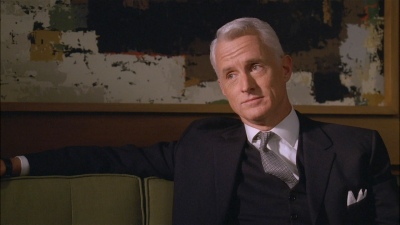 |
| [click on the thumbnail to enlarge] |
For what it's worth, I did listen to all twenty-six tracks in full, and they struck me as more of a mixed bag than the assortment from the series' first season. The commentaries with the cast in particular are frequently disappointing. In far too many of these tracks, they settle into the habit of quietly watching each episode and lobbing out the occasional comment, and even then it's more likely to be a quick quip than any sort of insight. The commentary for "The Inheritance" with January Jones, Jon Hamm, and Vincent Kartheiser might get the nod as the worst in that respect. Even actors who I'd think would be especially well-suited to this sort of thing can be a letdown. As indescribably funny and charming as John Slattery and Joel Murray are, their conversation over "Six Month Leave" plays more like a low-energy episode of Mystery Science Theater 3000 with random jabs like "...and your pocket is orange!" and "there's no Santa Claus, baby." I was also disappointed that Mad Men's advertising consultant was brought onto an episode that doesn't take advantage of his job description, and once Bob Levinson finishes chatting about how he came onboard the series, his comments are interchangeable with most anyone else they could've brought into the recording booth. Of the actors, Elisabeth Moss has the most to contribute, and it's appreciated that she appears in four of these commentaries, including both of the tracks for the season finalé.
The one cast-only commentary that I found to be an essential listen is "The Mountain King", which pairs together Robert Morse and Christina Hendricks. The two of them are exceptionally personable, especially the warm, fatherly Morse who does a wonderful job keeping a steady stream of conversation bubbling. Among its highlights are Hendricks noting that she originally auditioned for a different role altogether, how her "great purple dress" was more memorable to one viewer than the shocking indignity Joan suffers in this episode, Morse's confusion when he was first told he had to take his shoes off to play Bert Cooper, and a confession about swiping a philosophy book from the set. Another standout is Lesli Linka Glatter and January Jones' commentary for "A Night to Remember", pointing out how Peggy settles into the role of creative director while Father Gills becomes more of an account manager as they promote a church-sponsored dance, and both note how certain events from the episode mirror what they and their families had witnessed at some point. Weiner's commentaries are consistently the best of the lot, and aside from his track over "Flight 1" with Jon Hamm -- which is quieter, more giggly, and more heavily weighted around surface notes than his eleven other tracks this season -- they're all rewarding listens.
The highlights
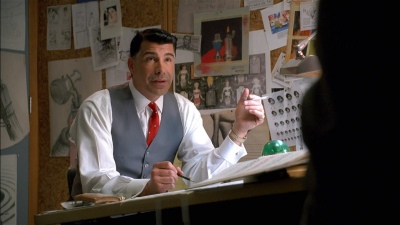 |
| [click on the thumbnail to enlarge] |
"An Era of Style" (22 min.; HD) documents fashion trends throughout the 1960s. The featurette begins with the 'Classic Era' that spans 1960 and 1963 -- the setting for the first two seasons of Mad Men -- emphasizing the gray flannel suits that were a staple of menswear as well as the particularly feminine dresses worn by women. From there, it explores how the mod British influence, miniskirts, and pantsuits that gained such a foothold in the middle of the decade would soon make way for the hippie revolution of the Rebellious Era. A number of stylists and fashion experts offer their thoughts, and "An Era of Style" incorporates glimpses of wardrobe culled from the show when appropriate.
The disparity
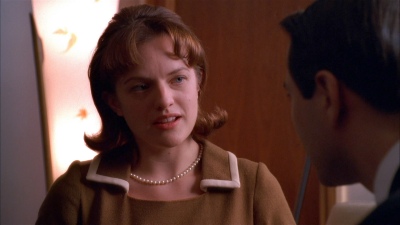 |
| [click on the thumbnail to enlarge] |
"Time Capsule:
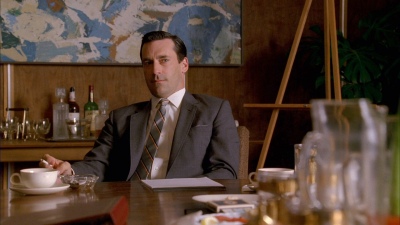 |
| [click on the thumbnail to enlarge] |
Rounding out the extras is a sampler for the second season soundtrack, offering thirty second excerpts of "Lollipops & Roses" by Jack Jones, "The Infanta" by The Decemberists, "Blue Room" by Perry Como, "Break It to Me Gently" by Brenda Lee, "Telstar" by The Tornadoes, "Pot Can't Talk About the Kettle" by Helene Smith, "Crooked Woman" by Edd Henry, and "A Beautiful Mine" by Jim Jacobsen.
Completists may be somewhat disappointed to learn that the "Inside Mad Men" clips from AMC's website have not been included. In their commentary for "Three Sundays", Elisabeth Moss and Colin Hanks also chat about a gag reel that, unless it's hidden as an Easter Egg, is nowhere to be found here either.
This second season of Mad Men comes packaged in a slimmer case than the initial set, and an episode guide is tucked inside along with a clever Clorox ad. The thirteen episode season is spread across three BD-50 discs, each with a main menu matching the screened artwork. It's also worth noting that Mad Men is a region-free set.
The Final Word
In its second season, Mad Men remains one of the most masterfully crafted and endlessly compelling series on television. Its release on Blu-ray is equally dazzling, from its stunning high definition presentation to its more than twenty-four hours of extras. As was the case with the initial set, Lionsgate has priced this high-def release of Mad Men's second season to be competitive with the DVD box, discarding the usual premium most studios tack onto their Blu-ray discs. I'd suggest that the uninitiated start with the first season, of course, but especially considering that several online retailers are offering such an outstanding Blu-ray set for just $30 or so, Mad Men is a near-essential purchase. Highly Recommended.
|
| Popular Reviews |
| Sponsored Links |
|
|
| Sponsored Links |
|
|
| Release List | Reviews | Shop | Newsletter | Forum | DVD Giveaways | Blu-Ray | Advertise |
|
Copyright 2024 DVDTalk.com All Rights Reserved. Legal Info, Privacy Policy, Terms of Use,
Manage Preferences,
Your Privacy Choices | |||||||









